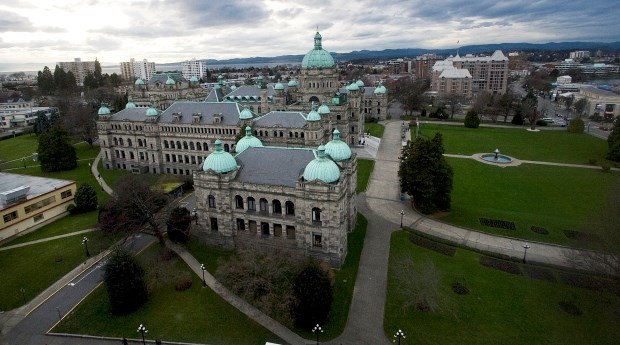Officially, our province’s motto is “Splendour without Diminishment.” But looking back on the year now closing, a better choice might be “Expect the Unexpected.”
Premier John Horgan led off the year with a political bombshell. Despite promises to the contrary when the NDP was in opposition, Horgan announced that B.C. Hydro’s Site C dam would go ahead.
His reasoning was simple. More than $4 billion had already been spent on the project. How could he tell taxpayers all that money was wasted?
Yet many in his caucus gagged at the decision. If his government weren’t clinging to the slimmest of margins in the legislature, defections might have followed.
Provincial Finance Minister Carole James produced a surprise of her own.
In her February budget, she committed to phasing out MSP premiums by 2020. Nothing unexpected there. The outgoing B.C. Liberal government had made the same commitment.
But she caught everyone off guard by introducing a new payroll tax on employers to pay for the scheme. As well as shocking the business community and municipalities, James broke one of the first rules in budget-making. If you have bad news to announce, give a warning in advance.
Sadly, the fentanyl crisis rolled on unchecked. From just 12 fentanyl-related deaths in 2012, provincewide, the death toll rose to 1,220 by 2017. While final figures are not yet available for 2018, it is possible that total will be exceeded.
While there are powerful arguments on both sides of this issue, prosecuting illicit-drug users increasingly looks like a failed strategy. Perhaps it’s time to bring addicts in from the cold.
The construction of tent cities in urban parks has become a major challenge. There had been previous instances, most notably the encampment on Victoria’s courthouse lawn in 2016.
But new tent cities sprang up in Saanich and Nanaimo not long after.
Court orders have given homeless people the right to occupy public property, but unhelpfully, they have failed to define precisely how far that right extends. This confronts municipalities with a nearly unmanageable task. How do you plan in the midst of a legal vacuum?
For the second year running, summer skies across much of the province clouded over with smoke from forest fires.
Indeed, for several months air quality became a serious health hazard, as fires burned out of control.
This is not a wholly new phenomenon. Most of B.C. is one large forest. Fires are inevitable.
But what is new has been the emergence of huge infernos far exceeding previous experience. In 1950, then the worst year on record, 3,433 square kilometres of forest burned. In 2018, 12,985 square kilometres went up in smoke.
This is an issue the provincial government needs to get on top of. It has been estimated that 40 per cent of fires are caused by humans.
Yet the fine for failing to comply with a fire-control order is relatively puny — $575. Far higher penalties will be required to control what has become a recurring disaster.
And talking about smoky skies, the possession of marijuana is now legal, as federal legislation has taken effect. In B.C., individuals 19 and over are allowed to purchase up to 30 grams at a time, and to retain a maximum of 1,000 grams at home.
The B.C. Liquor Distribution Branch will operate publicly owned stores. The first has already opened in Kamloops. Private outlets are also in the pipeline.
The civic elections in October provided our first look at what happens when financial contributions to candidates are greatly scaled back. The objective was to level the playing field.
That was accomplished, but at a price. In Vancouver, 71 candidates swarmed the ballot sheet for a place on city council. In Victoria, there were 29 council hopefuls and a further 10 running for mayor.
Add in people vying for seats on school boards, and voters are confronted with a virtual telephone directory to choose from.
So yes, our civic elections are more open and democratic, but selecting which candidate to vote for has become something of a shot in the dark.
November saw the two most senior officials of the B.C. legislature, the clerk, Craig James, and sergeant-at-arms Gary Lenz, marched out of the building under police escort.
This extraordinary event, unprecedented in Commonwealth history, was brought about by Speaker Darryl Plecas. He had conducted an inquiry without consulting members of the legislature to whom he is accountable.
Plecas has refused to reveal the nature of whatever wrongdoing he believes occurred. But he says he will resign if people do not vomit in the streets when the facts become known.
A police investigation is underway, and it seems reasonable to assume there will be either criminal charges or six-figure lawsuits by James and Lenz.
The year closed in the most dramatic manner imaginable. The referendum to change our electoral system failed, with 61.3 voting to keep first-past-the-post, and 38.7 supporting proportional representation.
After months of vigorous debate, many observers — and partisans on both sides — thought the Yes campaign was headed for victory. Supporters of proportional representation seemed more motivated than those who backed the status quo. The lopsided win was a surprise to just about everyone.
The decision is a stunning setback for the Green Party, whose three seats in the legislature in no way match its share of the vote (about 17 per cent at the last provincial election).
Neither was the result a favour to Horgan, who campaigned for the Yes side.
B.C. Leader Andrew Wilkinson, however, is no doubt breathing a sigh of relief. Proportional representation might have guaranteed an NDP/Green alliance into the indefinite future.



